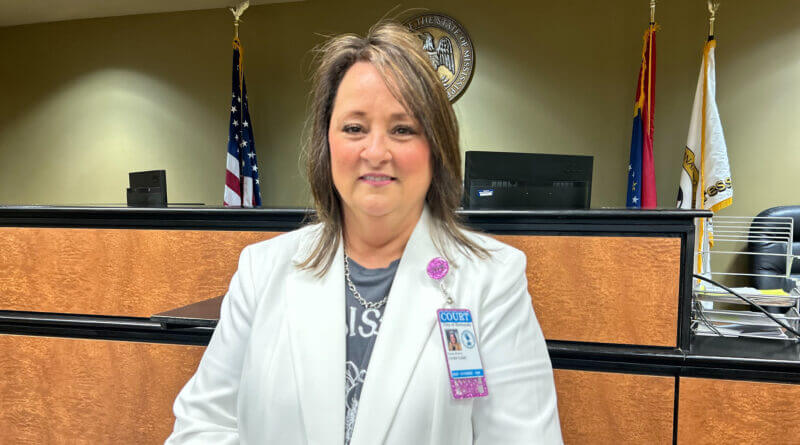Meet Hernando’s Municipal Court Clerk Cassi Perry
Photo: Cassi Perry, Hernando Municipal Court Clerk in the court chambers. (Bob Bakken/desotocountynews.com)
Many in the court system believe the Hernando Municipal Court is among the best run in the state. A lot of the credit for that goes to the current Municipal Court Clerk, Cassi Perry, who has led the office for the past 19 years. Working with the municipal judges on the court side and Mayor Chip Johnson on the city side, Perry wades through a myriad of responsibilities with the help of her deputy clerks and office staff.
Perry is also active with the Mississippi Municipal Court Clerks Association helping raise funds for the needed training and conferences, but also to fund scholarships for graduating high school students about to enter college.
There’s a lot that the Clerk’s office has to do and be on top of, as we learned when we recently chatted with Perry about her position.
What does a city court clerk do here in the city of Hernando?
“Basically the clerk’s position is different from a deputy clerk position. Deputy clerks handle the processing of the tickets and arrests when they come in, verifying that all the paperwork is correct. We have all the documentation that the court needs before the file is created. We make sure the officers didn’t leave out anything, prepare that docket and get it into the system. In turn, when you enter it into the system that creates the court docket. They do that process every day in turn and turn phones happen. Attorneys with cases that have been appointed or assigned to the case.
“The clerk itself does more delegating and the supervision, making sure all the laws are kept up. We report everything to the state correctly and that all the forms are up to date. We are keeping our budget in line with the needs of the court.
“I do the handling of cash bonds that come in from the jail when people get arrested and they post a cash bond, making sure those get assigned to the court docket so the court knows that they’ve have an account with money in it, so if they choose they can apply that money to their case. We have to refund it back if there’s any balance.”
It sounds like it’s a position that requires a lot of accuracy and also a lot of maintaining the information that the court needs ahead of time and then also processing what happens after that, and then you have different reporting that you have to do like to the state level and different registries and things like that correct?
Yes, you’ve have domestic registries, DUI registries, and based on what happened in court is based on what we put into the registries, and then you’ve have your breakdown of all your citations, what actually goes to the state and what doesn’t go to the state, DUI reports that have to be turned in within a certain amount of time.
For certain things you have five days on you have 24 hours, you have 45 days. If they don’t, then technically by statute, the clerk could be responsible out of their pocket. So they don’t tap the city, they tap us personally. So things are very time crunched, and you gotta be very detailed. Because you want to make sure everything that is reported to the state is correct. You don’t want to put something wrong to them.
If somebody is out on bond and they don’t show up for court, there’s three different stages to a bond and a lot of people don’t understand that. They don’t show up for court, we revoke it. We only have a certain amount of time to get that paperwork to that bond company and let them know that hey, your person didn’t show up for court. Either you need to find him or you need to pay me the face value of that bond.
They don’t, then we go into another stage. We only have a certain amount of time to get that documentation to them. Then again, we’re at another stage. You gotta find them or pay the bond.
One good thing about a court clerk is the power they have over a bond company. If they don’t do all these things, we can report it to the state and we can revoke their license, so they’re knocking on our door very quickly because they won’t be able to bond anybody if it gets to that point. We have had that happen, but they correct it and then we report it to the state and they’re up to date with us.
You worked with recently retired municipal judge Tony Nowak as you learned your position. What was it like to work with him?
“I have to say I could not have had a more pleasant and more understanding boss than Tony. He was the world’s best. I miss him so much. He was very educational. He liked to teach. He would explain stuff. You know, I would ask him something like, ‘Can we do this?’ and he wouldn’t just immediately tell me no. He would research it and see if it can be done because he was very much interested by the book.
He wanted to make sure everything is run correctly. But you know, there were certain things that he’d be like, ‘Yeah, well, I think we can do that.’ Whatever made our life easier on the other side, he was willing to do that if the law allowed it.






